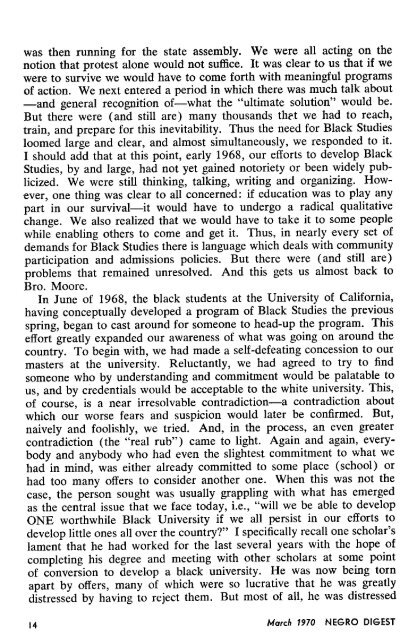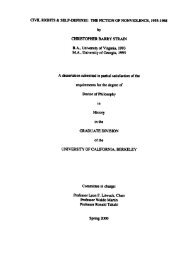Negro Digest - Freedom Archives
Negro Digest - Freedom Archives
Negro Digest - Freedom Archives
Create successful ePaper yourself
Turn your PDF publications into a flip-book with our unique Google optimized e-Paper software.
was then running for the state assembly . We were all acting on the<br />
notion that protest alone would not suffice . It was clear to us that if we<br />
were to survive we would have to come forth with meaningful programs<br />
of action . We next entered a period in which there was much talk about<br />
-and general recognition of-what the "ultimate solution" would be .<br />
But there were (and still are) many thousands th2t we had to reach,<br />
train, and prepare for this inevitability . Thus the need for Black Studies<br />
loomed large and clear, and almost simultaneously, we responded to it .<br />
I should add that at this point, early 1968, our efforts to develop Black<br />
Studies, by and large, had not yet gained notoriety or been widely publicized<br />
. We were still thinking, talking, writing and organizing . However,<br />
one thing was clear to all concerned : if education was to play any<br />
part in our survival-it would have to undergo a radical qualitative<br />
change . We also realized that we would have to take it to some people<br />
while enabling others to come and get it . Thus, in nearly every set of<br />
demands for Black Studies there is language which deals with community<br />
participation and admissions policies . But there were (and still are)<br />
problems that remained unresolved . And this gets us almost back to<br />
Bro . Moore .<br />
In June of 1968, the black students at the University of California,<br />
having conceptually developed a program of Black Studies the previous<br />
spring, began to cast around for someone to head-up the program . This<br />
effort greatly expanded our awareness of what was going on around the<br />
country . To begin with, we had made a self-defeating concession to our<br />
masters at the university . Reluctantly, we had agreed to try to find<br />
someone who by understanding and commitment would be palatable to<br />
us, and by credentials would be acceptable to the white university . This,<br />
of course, is a near irresolvable contradiction-a contradiction about<br />
which our worse fears and suspicion would later be confirmed . But,<br />
naively and foolishly, we tried . And, in the process, an even greater<br />
contradiction (the "real rub") came to light . Again and again, everybody<br />
and anybody who had even the slightest commitment to what we<br />
had in mind, was either already committed to some place (school) or<br />
had too many offers to consider another one . When this was not the<br />
case, the person sought was usually grappling with what has emerged<br />
as the central issue that we face today, i .e ., "will we be able to develop<br />
ONE worthwhile Black University if we all persist in our efforts to<br />
develop little ones all over the country?" I specifically recall one scholar's<br />
lament that he had worked for the last several years with the hope of<br />
completing his degree and meeting with other scholars at some point<br />
of conversion to develop a black university . He was now being torn<br />
apart by offers, many of which were so lucrative that he was greatly<br />
distressed by having to reject them . But most of all, he was distressed<br />
14 Morch 1970 NEGRO DIGEST
















